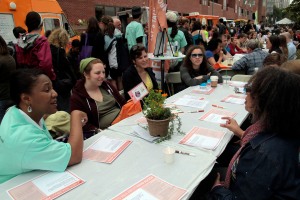Archive
Let’s Talk About Food
 The dreary weather conditions in the Boston area this past weekend did not discourage thousands of people from attending an innovative outdoor festival at the Museum of Science celebrating and exploring our relationship with food and food systems.
The dreary weather conditions in the Boston area this past weekend did not discourage thousands of people from attending an innovative outdoor festival at the Museum of Science celebrating and exploring our relationship with food and food systems.
As one of several volunteer facilitators, I had the privilege of engaging in conversations at an “endless table” where festival attendees dropped in to discuss various aspects of food production, distribution, consumption, and regulation.
Festival organizers set the conditions for lively dialogue by providing dry-erase placemats that offered provocative data points and questions relating to six topic areas: Nutrition, Food Access, Seafood, Farming, Food Safety, and Labels and Marketing. Experts on hand to field questions and share their opinions included farmers, wholesale buyers, food scientists, academics, public health officials, and consumer and community advocates. The reflections and suggestions generated in the conversations were captured by museum staff for later publication on the web.
I don’t know which I enjoyed more, picking up a lot of new insights about how “what we eat affects our bodies, our planet, our economy, and our future,” or marveling at our capacity for constructive public discourse when we design the process effectively. A spirit of collective curiosity and good will was palpable throughout the event.
After the festival I found myself appreciating how the simple act of eating connects us to so many other human beings through unseen threads of interdependence. I thought of Thich Nhat Hanh’s good counsel to savor our food and his observation that an “…apple is not simply a quick snack to quiet a grumbling stomach. It is something more complex, something part of a greater whole.”
Like the apple, we are each a complex part of a greater whole. Thanks to the Museum of Science and its sponsors for helping us stay mindful of that delicious complexity.
Dignity
 Among the many delights under the Christmas tree this year was a beautiful book of photographs that my son received from his Aunt Clare. Called Dignity, the book celebrates both the fiftieth anniversary of Amnesty International and the United Nations’ Declaration on the Rights of Indigenous Peoples adopted in 2007.
Among the many delights under the Christmas tree this year was a beautiful book of photographs that my son received from his Aunt Clare. Called Dignity, the book celebrates both the fiftieth anniversary of Amnesty International and the United Nations’ Declaration on the Rights of Indigenous Peoples adopted in 2007.
As I browsed through the striking images of indigenous people from all over the world, I was curious about why photographer Dana Gluckstein had opted to identify her subjects not by name, but by tribal affiliation, location, and date. If this was a book about dignity, I wondered, wouldn’t it be important to recognize these individuals’ unique identities?
Finding the subjects’ names in the artist’s acknowledgments toward the back of the book, I realized that respect for the individual was indeed one of Gluckstein’s aims. But more important for this project was illuminating the dignity these people express by representing something larger than themselves; something that the book invites us all to be part of. Archbishop Desmond Tutu captures this invitation in his foreword:
We must be grateful to those who remind us of our common bond. The work of Dana Gluckstein embodies ubuntu. It helps us to truly see, not just appearances, but essences, to see as God sees us, not just the physical form, but also the luminous soul that shines through us. Pick up this glorious book and look into the eyes of your relatives, those distant cousins you have not seen in so many years, for whom your heart ached without knowing. Greet each other again, with the love and healing that comes with reunion, and know that in protecting their rights and their way of life, you protect the wellbeing of us all and the future we share, for we are all, every one of us, precious members of the family of earth.
It took decades for indigenous activists to persuade the member countries of the UN to adopt the 2007 Declaration (and there were some notable holdouts, including the US and Canada, who have since agreed to review their positions on the matter). The Declaration affirms Indigenous Peoples’ equal sovereignty with other Nations regarding respect for their sacred places, languages, and ways of life.
Amnesty International Executive Director Larry Cox observes in his epilogue, “What we can learn from the indigenous leaders who labored so long to bring forth an international declaration is that when people have a sense of their own dignity, they are unstoppable.”
I would add that when people have a sense of their own dignity, they are better able to see the dignity in others. Here at the start of a new year, what might you do to see and celebrate your own dignity?